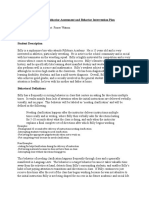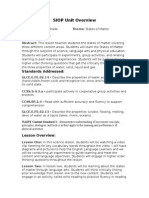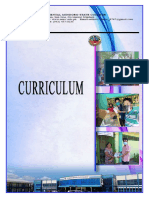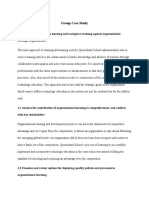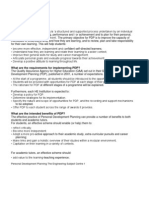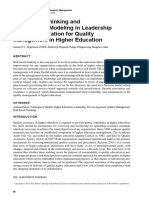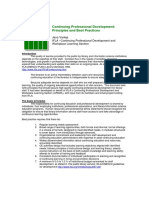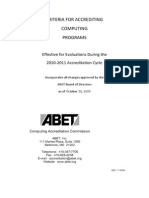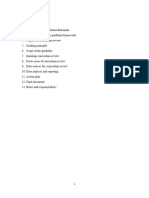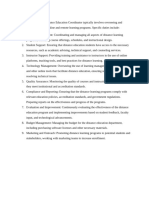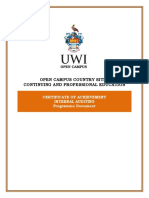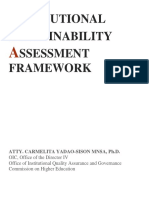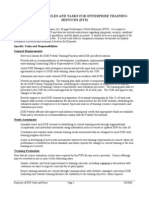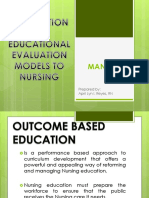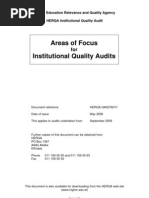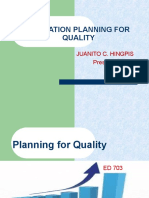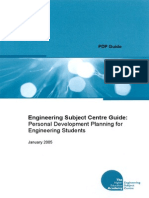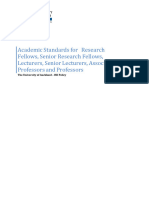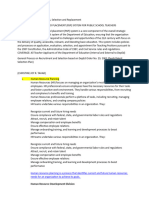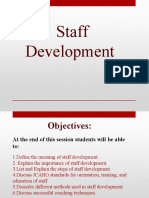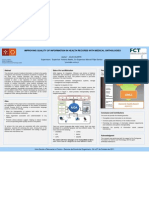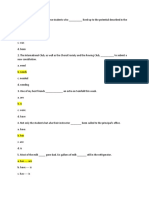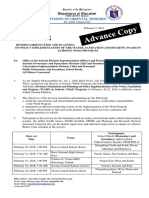Criteria and Weightages
Criteria and Weightages
Uploaded by
Satheesh KumarCopyright:
Available Formats
Criteria and Weightages
Criteria and Weightages
Uploaded by
Satheesh KumarOriginal Title
Copyright
Available Formats
Share this document
Did you find this document useful?
Is this content inappropriate?
Copyright:
Available Formats
Criteria and Weightages
Criteria and Weightages
Uploaded by
Satheesh KumarCopyright:
Available Formats
CRITERIA AND WEIGHTAGES
15. CRITERIA FOR ACCREDITATION One of the major objectives of NBA is to encourage the institutions to continually strive towards the attainment of excellence. The NBA evaluation processes are so designed as to facilitate identification of the strengths and weaknesses of the programmes under accreditation. The NBA hopes that this will help the institutions in improving the quality and effectiveness of their programmes. As indicated in an earlier paragraph, the evaluation process is based on a set of eight broad-based criteria developed through a lengthy participatory process involving more than 1000 participants concerned with Technical Education all over India. These criteria are being described here in some detail. Each criterion serves to assess a principal feature on the institutional activities and programme effectiveness. Hence, each of them is described in terms of carefully identified parameters, amenable to a substantially objective and quantitative assessment. Institutions seeking accreditation of their programmes are expected to satisfy each of the criteria individually. They are expected to adhere to these criteria during the validity period of accreditation granted.. They are also encouraged to periodically review the strengths and weaknesses of their programmes and strive for their continuous improvement. Criterion I : ORGANIZATION AND GOVERNANCE This criterion applies to Institutional Management, Organization and Governance. Every institution should have a mission and a set of goals. Every programme offered by the institution should also have its objectives and goals. The mission and goals should be articulated and made known to every one in the institution. The successful pursuit and realization of the mission and goals and the means adopted to accomplish them brings out the quality of the institution and its programmes. The goals should be concrete and realistic within the context of the committed resources. They should define the educational and other dimensions, including scholarship, research, public service and customer satisfaction. The effectiveness and extent of achievement of goals depend on the commitment, attitude, planning and monitoring capacity, incentives and self-appraisal policies of the Management. Similarly, Organization and Governance depend on the qualities of leadership, motivation, transparency of the operation, decentralization and delegation of powers, participation of faculty in the management, planning, and general efficiency indices. Criterion II: FINANCIAL RESOURCES, ALLOCATION AND UTILIZATION There is a need for the institution to be financially stable. The financial resources should be adequate to sustain not only the achievement of current educational objectives, but also provide for improvements in the foreseeable future. There should be a mechanism to ensure proper financial management and a well-organized process. Not only the
allocation of adequate budget for capital (non-recurring) works (including infrastructure, and equipment ) and Operational (Maintenance) budget and development budget of recurring type are important, but also their utilization for institutional/departmental activities besides, generation/mobilization of finances are also important for the future of institution/programmes. Criterion III: PHYSICAL RESOURCES (CENTRAL FACILITIES) There must be available adequate space and appropriate physical resources, including buildings, laboratories, equipment, material, library and other ancillary facilities. While examining the physical resources, there is a need to ensure provisions for safety, security and hygiene. Besides, the availability of language laboratory, councelling and guidance celll, medical facilities, canteen, transport and other units. will go a long way in gaining the confidence and respect of students and faculty/staff alike, leading to considerable improvements in the quality of the programmes. Criterion IV: HUMAN RESOURCES : FACULTY AND STAFF The faculty strength, cadres, qualification and level of competence and performance should be adequate to accomplish the institutional mission and goals. The commitment, attitudes and communication skills of the faculty play an important and crucial role in successfully running the academic programmes. This, in turn, depends upon the recruitment procedures, incentives, exposure to industrial activities, faculty development programmes and workload of the faculty. Each institution should have self-appraisal and in-house performance -appraisal mechanisms to monitor and ensure their continued effectiveness. The qualifications of the faculty relevant to the programme area are generally measured by the advanced Degrees held by them, and their scholarship, creative activities and professional experience. The faculty are expected to act not only as instructors, but also as student advisors, academic planners and curriculum developers, and also to assist in institutional administration. Faculty selection reflects the effectiveness of the management's commitment. The institution is expected to adopt an open process for recruiting its faculty members. Adequate employment security, salaries and benefits to commensurate with the position, provision for continued professional development, and periodic evaluation for their vertical mobility should be ensured and made known to the faculty. The workload of the faculty should be such that it should not hinder their effective performance. The institution should protect and foster academic freedom for each member of the faculty and develop mechanisms to ensure that the faculty act responsibly, ethically and in conformity with the prescribed conditions of employment. The faculty members should strive to maintain professional competence and scholarly pursuits. In the case of supporting staff, besides adequate numbers and appropriate qualifications, the requirements are: hands-on experience, skills, attitudes, commitment and involvement with the institutional objectives. The recruitment procedures, performance appraisal, incentives skill development possibilities and rewards should be transparent and objective. The inter-personal relations and interactions among and between faculty,
supporting staff and students constitute an important ingredient in achieving the institutional goals. Criterion V : HUMAN RESOURCES: STUDENTS The administrative policies and procedures should be objective and transparent. The number of qualified candidates in national/state level tests, the number admitted and dropouts , their ranking in the overall merit list of candidates seeking admission, are some of the factors that reflect the institutional effectiveness. The evaluation procedures, academic results and time taken for completion of these requirements are important parameters. The graduation requirements should be made known to every student. The Diploma/Degree awarded should appropriately reflect the student's attainments. Information with regard to employment of the graduates and feedback from the employers help the institution to reorient its goals so as to enhance effectiveness. Criterion VI: TEACHING-LEARNING PROCESSES Each Diploma programme should be comprehensive to provide the student sufficient inputs in basic sciences, technical subjects (including general and specific/chosen), different technologies and training in relevant experimental/technical skills, so as to embark on a technical career as a Diploma holder or to enter into a professional engineering stream. Each undergraduate Degree programme should embody general and specialized professional content of adequate depth and breadth , and should include appropriate Humanities and Science components. The core of the main programme should concentrate on acquisition of knowledge and skills in the specific discipline, and also ensure exposure to inter-disciplinary areas. There should also be an effective relationship between the curricular content and practice in the field of specialization. In addition, the students successfully completing the programme should demonstrate their competence in oral communication, scientific and quantitative reasoning, critical analysis, logical thinking, creativity and capacity for self-learning. Postgraduate degree programmes should be designed to give students mastery in their specialized field of study. They should have coherent curricula and should enable the students to advance substantially beyond the educational requirements of the undergraduate Degree level.. The institutions offering both undergraduate and postgraduate Degree programmes should assess the relationship and interdependence of the two levels, and utilize the resources of both for collective improvement. Postgraduate programmes should not be offered unless resources and expectations greatly exceed those required for the corresponding undergraduate programme. The academic calendar, number of instructional days, contact hours per week, delivery of syllabus, student evaluation and feedback are some of the important aspects in evaluating the teaching-learning processes. Effective teaching-learning processes include the development of practical skills through laboratory experiments, workshop practice and operation of modern equipment. They also require the inculcation of computing skills which make the availability of extensive library, internet and educational technology
facilities a major necessity. The budget provision to meet the expenditure for the consumables required in the laboratories and the workshops is one of the indicators of the extent of hands-on practice that can be given. Implementation of the instructional programmes, lectures, tutorials, student-teacher interactions, group discussions, student centric learning initiatives, seminars and laboratory work have a direct bearing on the effectiveness of the teaching-learning processes. Maintenance of the course files by the teachers will help in assessing the effectiveness of the teaching and learning processes. Criterion VII : SUPPLEMENTARY PROCESSES The institution should provide the environment, which fosters not only the intellectual, but also the personality development of its students. It should have personality development opportunities provided through co-curricular and extra-curricular activities and student services. These opportunities are to enable the students to become responsible members of the society. The services and facilities should be readily accessible to the students. The students undergoing the programme should have access to facilities for career development, counselling and health education. Opportunities to develop leadership qualities and participation in seminars and group discussions should be created. The institution offering the programme should ensure that individuals responsible for cocurricular activities are well trained with work experience and possess personal qualities required to deal with the needs of students effectively. Facilities and funding should be adequate to create and maintain these student services. Policies concerning student responsibilities and grievance-redressal procedures are to be clearly stated and publicized. There should be a mechanism for regular and systematic evaluation to assess the fulfillment of the co-curricular goals and student needs. Counselling and Guidance, professional society activities and entrepreneurship development, business ethics are some of the supplementary processes, which need to be promoted. Substantial feedback from employers and alumni should be obtained to assess the effectiveness of the academic programmes. Criterion VIII : RESEARCH & DEVELOPMENT AND INTERACTION EFFORT In the case of Diploma and undergraduate Degree programmes, teachers should participate in projects and quality improvement programmes in research institutions/ University departments. Such an involvement will not only improve the teachinglearning processes, but also enhance the quality of project work. In the case of postgraduate Degree programmes, the aim should be to attain the stature of a Centre of Excellence. Grant of the status of Special Assistance Programme/ COSIST or other such support from UGC and other Agencies of the Government is an indication of the quality of the postgraduate Degree Programmes. The department should also undertake academic/ sponsored industrial R & D projects. Joint guidance with industry/ R & D laboratory/ other institutions for Ph. D theses / M Tech. Projects will not only develop close interaction between the department, industry and R & D laboratories, but
will also enhance the quality if research. The criteria for evaluation of the Ph. D theses and M Tech. projects are important indicators of the quality of research work. Publications, citations, patents and resource allocation are the other indicators of the effectiveness of research work relevant to the postgraduate programmes Industry participation in curriculum planning, consultancy, project work and extension lectures are essential to achieve the professional goals of the academic programmes in Engineering and Technology. At the same time, the knowledge and experience of the teachers can be utilized by the industry for technical advice. This, in turn, will help the teachers to gain insight into the latest industrial practices. The fast-changing technologies also call for Continuing Education Programmes for personnel from industry. Similarly, industrial-internship for faculty will give them a sound exposure to the industrial practices. Industrial visits and industrial training are essential for creating professionalism among the students, and will help them in securing placement at appropriate levels in industries and other employment sectors.
16.
ACCREDITATION PARAMETERS AND THEIR WEIGHTAGES Each of the criteria described above has been broken down into parameters, and weightages have been assigned to these parameters by the NBA. The parameters and the weightages assigned to them, which are different for Diploma, undergraduate(UG) Degree and postgraduate( PG) Degree programmes are given below:
PARAMETERS Dip PG (30)
MARKS UG (80)
I. ORGANISATION AND GOVERNANCE (50) A Planning and Monitoring B Recruitment Procedure & its Effectiveness C Promotional Policies/Procedure D Leadership E Motivational Initiatives F Transparency G Decentralization and Delegation & participation of faculty H Constitution of GC/GB PG
Dip.
UG
II. FINANCIAL RESOURCES, ALLOCATION (50) & UTILIZATION II.1 A B II.2 A B Budget allocated to the Institution & Utilization 25 Recurring budget Non-recurring Budget Budget allocated to the Department& Utilization 25 Recurring budget Non-recurring Budget
(70)
(70)
35
35
35
35
Dip. PG III. PHYSICAL RESOURCES (50) (CENTRAL FACILTIES) A Students Hostel (Men & Women) B C D , F G H I J Power back up: Institution/Department/Hostels Reprographic facilities Bank Post Office Counseling and Guidance, Language Lab. Medical Facility Internet Facility Canteen Transport Dip. PG IV. HUMAN RESOURCES (200) (FACULTY & STAFF) IV.1 A B C Faculty 160 Numbers, Student Faculty :Ratio, Cadre ratio Avg. experience, faculty retention, Turnover Qualifications Participation of faculty in Institutional development/ Departmental development/ Academic matters/ Students Development/ Self growth (200) (50)
UG (50)
UG (200)
160
160
D E F
Implementation and Impact of Faculty Development initiatives Analysis and Follow-up of Performance appraisal Service rules, pay package, incentives Dip. UG 40 PG Support Staff(Tech./Adm.) 40 Numbers Qualification/ skills (Lab., Office, Computer centre etc.) Skill upgradation
IV.2 A B C
40
Dip. PG V. HUMAN RESOURCES-STUDENTS (100) A
B C D Student admissions Academic results Performance in competitive examinations Placement Dip. PG
UG (100)
(100)
UG (350)
VI. TEACHING-LEARNING PROCESSES
(250) A B C D E F G H Delivery of syllabus, contents Contents beyond the syllabus Academic calendar Continuous evaluation procedure Utilization of Laboratories/ Equipment Information access facilities Student centric learning initiatives Students feedback
(450)
Dip. PG
UG
VII. SUPPLEMENTARY PROCESSES
(50) A B C D E F G Extra & co-curricular activities Personality Development initiatives Professional society activities Entrepreneurship Development Alumni Interaction Ethics Students Publications/ Awards
(50)
(50)
Dip. PG VIII. R&D AND INTERACTION EFFORT (250) A B C D E F G Budget for in house R&D activities and its utilization Academic/ Sponsored/Industrial research and development Publications and Patents Industry participation in developmental and student related activities Continuing Education (organizing & attending) Consultancy and Testing Students Project Work (50)
UG (100)
You might also like
- Functional Behavior Assessment and Behavior Intervention PlanDocument14 pagesFunctional Behavior Assessment and Behavior Intervention Planapi-301956295100% (2)
- DLP Rhyming Words 2Document3 pagesDLP Rhyming Words 2Carol Gelbolingo100% (7)
- Manual (QCE of NBC 461)Document42 pagesManual (QCE of NBC 461)Lasierdo Maria Sol Kristine95% (38)
- Siop UnitDocument14 pagesSiop Unitapi-273446670100% (1)
- ISA PrimerDocument20 pagesISA Primeracheron_pNo ratings yet
- CBET AssessmentDocument63 pagesCBET AssessmentShaguftaAbbasNo ratings yet
- 1 2curriculum Narrative ProfileDocument76 pages1 2curriculum Narrative Profilepeter cuevasNo ratings yet
- Hal 157-173Document3 pagesHal 157-173PUTRI NABILANo ratings yet
- Guidelines Establishment of QA SystemsDocument4 pagesGuidelines Establishment of QA Systemstikki0219No ratings yet
- Learning StrategyDocument10 pagesLearning StrategyMahnoor AzharNo ratings yet
- Staff Development Strategy (2021 - 2022)Document13 pagesStaff Development Strategy (2021 - 2022)Oeun PenhNo ratings yet
- Qualitative Contribution Evaluation (Qce) : of The National Budget Circular (NBC) No. 461Document19 pagesQualitative Contribution Evaluation (Qce) : of The National Budget Circular (NBC) No. 461Jayson PalmaNo ratings yet
- SM Draft Property SolutionsDocument12 pagesSM Draft Property SolutionsMadalitso MukiwaNo ratings yet
- Human Resource StrategyDocument8 pagesHuman Resource StrategyMuhammad Omer AteequeNo ratings yet
- Assignments Specializedarea: Higher Education Master Ofarts (Education) - 2Nd Year January 2019 & July 2019Document6 pagesAssignments Specializedarea: Higher Education Master Ofarts (Education) - 2Nd Year January 2019 & July 2019Rajni KumariNo ratings yet
- Quality Assurance Practices in Higher Education in AfricaDocument53 pagesQuality Assurance Practices in Higher Education in AfricaLuvonga CalebNo ratings yet
- A Comparative Study of Performance Measurement in Selected Professional Management Institutions: A Case Study of Karad CityDocument6 pagesA Comparative Study of Performance Measurement in Selected Professional Management Institutions: A Case Study of Karad Cityadmin2146No ratings yet
- Iquame Primer 022007Document12 pagesIquame Primer 022007Edmund Ocado JrNo ratings yet
- What Is PDP?: Personal Development Planning The Engineering Subject Centre 1Document5 pagesWhat Is PDP?: Personal Development Planning The Engineering Subject Centre 1Maggi Goofy Curly0% (1)
- NBC No. 461 QCE Manual of OperationsDocument42 pagesNBC No. 461 QCE Manual of OperationsGlenn John Balongag100% (1)
- Criteria For Measuring Quality Assurance of Business Education Programme in Rivers State UniversitiesDocument14 pagesCriteria For Measuring Quality Assurance of Business Education Programme in Rivers State UniversitiesSTEPHEN NKORONo ratings yet
- Higher Education AccreditationDocument29 pagesHigher Education AccreditationKhin Sandar TunNo ratings yet
- Action Plan For CoTM Program Acceridation 2023Document11 pagesAction Plan For CoTM Program Acceridation 2023amare ayeleNo ratings yet
- Performance MatricsDocument6 pagesPerformance MatricsibboodaseNo ratings yet
- Risk Based Thinking and Contingency Modeling in Leadership and Administration For Quality Management in Higher EducationDocument22 pagesRisk Based Thinking and Contingency Modeling in Leadership and Administration For Quality Management in Higher EducationonisimlehaciNo ratings yet
- Continuing Professional DevelopmentDocument3 pagesContinuing Professional DevelopmentmaxiNo ratings yet
- Criteria For Accrediting Computing Programs: Effective For Evaluations During The 2010-2011 Accreditation CycleDocument6 pagesCriteria For Accrediting Computing Programs: Effective For Evaluations During The 2010-2011 Accreditation CycleJuan Francisco Pacheco TorresNo ratings yet
- Qualitative Contribution Evaluation (Qce) : of The National Budget Circular (NBC) No. 461Document42 pagesQualitative Contribution Evaluation (Qce) : of The National Budget Circular (NBC) No. 461Amy Lizbeth RicoNo ratings yet
- Curriculum Review FrameworkDocument10 pagesCurriculum Review FrameworkMahteb WeldeNo ratings yet
- Assignment Development and Maintenance of Standards and Accreditation in Nursing Education ProgramsDocument10 pagesAssignment Development and Maintenance of Standards and Accreditation in Nursing Education ProgramsLavie GangwarNo ratings yet
- Trainers Methodology II Develop Training CurriculumDocument38 pagesTrainers Methodology II Develop Training CurriculumOgie Achilles Testa100% (1)
- Trainers Methodology II Develop Training CurriculumDocument42 pagesTrainers Methodology II Develop Training CurriculumPor LanceNo ratings yet
- Roles and ResponsiblitiesDocument23 pagesRoles and ResponsiblitieshailayNo ratings yet
- Expectations and Outcome Indicators - EOI. 2.0Document4 pagesExpectations and Outcome Indicators - EOI. 2.0saira fatimaNo ratings yet
- QEC Presentation at LSEDocument24 pagesQEC Presentation at LSENadeem MustafaNo ratings yet
- Internal Auditing - ProgDocument117 pagesInternal Auditing - ProgSheree WelchNo ratings yet
- Revised Training and Assessment Strategy (TAS) - TemplateDocument4 pagesRevised Training and Assessment Strategy (TAS) - TemplateraviNo ratings yet
- Institutional Sustainability Assessment FrameworkDocument14 pagesInstitutional Sustainability Assessment Frameworkrose de leonNo ratings yet
- Curriculum Final ReportDocument7 pagesCurriculum Final ReportLeizle Almanon AmistosoNo ratings yet
- AAA-manual Best Read ItDocument165 pagesAAA-manual Best Read ItiqacssjbcNo ratings yet
- التقييم المعتمد على المعايير في الجامعاتDocument40 pagesالتقييم المعتمد على المعايير في الجامعاتQaidNo ratings yet
- DEB-RAJ-714-2017-218-PPR-master of Business Administration (Mba)Document16 pagesDEB-RAJ-714-2017-218-PPR-master of Business Administration (Mba)neekuj malikNo ratings yet
- Summary of Roles and Tasks For Enterprise Training Services (Ets)Document4 pagesSummary of Roles and Tasks For Enterprise Training Services (Ets)minnsallehNo ratings yet
- Recognising Learning For Credit: Guidelines For TheDocument11 pagesRecognising Learning For Credit: Guidelines For TheNoreen TagoNo ratings yet
- MAN 205 ReportDocument26 pagesMAN 205 ReportAPRIL LYNNo ratings yet
- HERQA-Quality Audit-Areas of Focus For Institutional Quality Audits PDFDocument11 pagesHERQA-Quality Audit-Areas of Focus For Institutional Quality Audits PDFHaftamu100% (1)
- Education Planning For Quality ReportDocument46 pagesEducation Planning For Quality Reportnaiar kramNo ratings yet
- Curriculum Design March 05, 2024Document13 pagesCurriculum Design March 05, 2024Udaya Kumar SusarlaNo ratings yet
- Guidelines For SAR (Draft) - ADocument56 pagesGuidelines For SAR (Draft) - AKhurram YousafNo ratings yet
- Bangladesh Accreditation Council (BAC) Standards For Accreditation of Academic ProgramDocument8 pagesBangladesh Accreditation Council (BAC) Standards For Accreditation of Academic ProgramHossain Mohammad AsifNo ratings yet
- PDP Guide2ergrg RG R RG RDocument20 pagesPDP Guide2ergrg RG R RG Rjiwani87No ratings yet
- Evaluation of Educational Programs in Nursing Course and Program V1Document13 pagesEvaluation of Educational Programs in Nursing Course and Program V1Stephina Immaculate100% (1)
- HaysDocument70 pagesHaysTrisha Kaira RodriguezNo ratings yet
- Academic Standards For Research Fellows Senior Research Fellows Lecturers Senior Lecturers Associate Professors and ProfessorsDocument31 pagesAcademic Standards For Research Fellows Senior Research Fellows Lecturers Senior Lecturers Associate Professors and ProfessorsNicholas JobidonNo ratings yet
- Evaluating Distance Education (Or ICT) Programs, Clayton R. WrightDocument5 pagesEvaluating Distance Education (Or ICT) Programs, Clayton R. WrightcrwrNo ratings yet
- 6assessment and Recognition Policy and Procedures TemplateDocument4 pages6assessment and Recognition Policy and Procedures Templatepragatiaryal1998No ratings yet
- CNE Credits Hours DetailsDocument15 pagesCNE Credits Hours DetailsKinjal VasavaNo ratings yet
- Human Resource Planning Is A Process That Identifies Current and Future Human Resources Needs For An Organization To Achieve Its GoalsDocument8 pagesHuman Resource Planning Is A Process That Identifies Current and Future Human Resources Needs For An Organization To Achieve Its Goalschristinejoytahad0125No ratings yet
- National Project Implementation Unit (NPIU) Technical Education Quality Improvement Programme (Teqip) Phase-IiDocument14 pagesNational Project Implementation Unit (NPIU) Technical Education Quality Improvement Programme (Teqip) Phase-IiAlluri Appa RaoNo ratings yet
- TeachingDocument18 pagesTeachingnuraNo ratings yet
- Pilot Testing Monitoring Evaluating The CurriculumDocument34 pagesPilot Testing Monitoring Evaluating The CurriculumPaul Jericho Caranguian100% (2)
- Public Sector Competency-Based Development and Self-Assessment Handbook: A Self Assessment Handbook for Public Servants, Their Supervisors and TrainersFrom EverandPublic Sector Competency-Based Development and Self-Assessment Handbook: A Self Assessment Handbook for Public Servants, Their Supervisors and TrainersNo ratings yet
- Journal of Quality Assurance for Higher Education Institutions in Malawi: Book IiFrom EverandJournal of Quality Assurance for Higher Education Institutions in Malawi: Book IiNo ratings yet
- MBBS - Fee Structure For 2021 22 RevisedDocument1 pageMBBS - Fee Structure For 2021 22 Revisedfaiza ansariNo ratings yet
- Unlikely Leaders QuotesDocument2 pagesUnlikely Leaders Quotesapi-272938791No ratings yet
- A4 - 2nd Quarter Exam UCSPDocument9 pagesA4 - 2nd Quarter Exam UCSPFelyn DelaCruz - DalinoNo ratings yet
- Chapter 5Document4 pagesChapter 5Nel OrtizNo ratings yet
- Rondo Zone 14 PDFDocument20 pagesRondo Zone 14 PDFRicardo Luiz100% (4)
- Improving Quality of Information in Health Records With Medical OnthologiesDocument1 pageImproving Quality of Information in Health Records With Medical OnthologiesSemana da Escola de Engenharia da Universidade do MinhoNo ratings yet
- Gmail - Correction On Scholarship Email - Hours To EnrollDocument3 pagesGmail - Correction On Scholarship Email - Hours To EnrollWilliam DoveNo ratings yet
- Sub Verb Agreement 1Document24 pagesSub Verb Agreement 1AatifNo ratings yet
- TLE - LP Q1 Method of PlantingDocument7 pagesTLE - LP Q1 Method of PlantingJoni GalarritaNo ratings yet
- Resume: Noel Mat-An Belvestre P-4 Doña Consuelo, Ozamiz CityDocument3 pagesResume: Noel Mat-An Belvestre P-4 Doña Consuelo, Ozamiz CityBasemath Rojas BacoNo ratings yet
- Yank 1945dec14 PDFDocument24 pagesYank 1945dec14 PDFjohn obrienNo ratings yet
- Peoples Insurance PLC Integrated Report 12768b PDFDocument308 pagesPeoples Insurance PLC Integrated Report 12768b PDFjayuse ofwadoNo ratings yet
- ICTE II Program Teacher Training Manual 2016-17Document302 pagesICTE II Program Teacher Training Manual 2016-17ElceOnline100% (2)
- PDS (Revised 2005)Document4 pagesPDS (Revised 2005)Pulisya Ng Sta Ana100% (1)
- Writing Your Own Educational PhilosophyDocument7 pagesWriting Your Own Educational PhilosophyAirene Abear PascualNo ratings yet
- July 2024Document130 pagesJuly 2024Hayotbek UsarovNo ratings yet
- FORM-14-15-16-DIAL-ME-TEST-RESULTS-GAD-COMPLIANTDocument14 pagesFORM-14-15-16-DIAL-ME-TEST-RESULTS-GAD-COMPLIANTSheryl ArescoNo ratings yet
- Business Educator 10 ZaneDocument498 pagesBusiness Educator 10 ZaneChad Danieley100% (1)
- Division Memo WinS School Roll Out (Fe Del Mundo NHS)Document8 pagesDivision Memo WinS School Roll Out (Fe Del Mundo NHS)GreatDharz DjDiego SolanoyNo ratings yet
- Teaching Hints For Book 2: Lane's English As A Second LanguageDocument15 pagesTeaching Hints For Book 2: Lane's English As A Second LanguageAytanGuluzadeNo ratings yet
- 2022 Jce Summary of Provisional Results Final Report Final 2022Document43 pages2022 Jce Summary of Provisional Results Final Report Final 2022Wä møxãvá grætérkíørkzñ KìddâNo ratings yet
- Alice in WonderlandDocument4 pagesAlice in WonderlandLuana IvanNo ratings yet
- ArchanaDocument2 pagesArchanaARCHANA SONKUSARENo ratings yet
- 5.chapter IDocument8 pages5.chapter IFifi AfifahNo ratings yet
- Philosophy of Multicultural EducationDocument6 pagesPhilosophy of Multicultural Educationapi-740234676No ratings yet
- Technical and Vocational Education and Training Issues in Malaysia and Asian Region: Where Do We Go From Here?Document11 pagesTechnical and Vocational Education and Training Issues in Malaysia and Asian Region: Where Do We Go From Here?Kamal JasmanNo ratings yet
- 2 Communication and GlobalizationDocument22 pages2 Communication and GlobalizationRaffy Torres GabuyogNo ratings yet
